#lake metigoshe
Text
Vacation: Lake Metigoshe, ND: Endless Adventures
The lake is always a fun time. You can do many different and fun things at the lake. Let’s venture out to Lake Metigoshe, ND, and see what family-friendly things we can find to do. Lake Metigoshe is on the US/Canada border and is one of the most popular places to vacation. It is in the Turtle Mountains and is just a fabulous place to visit and have some family fun.
Outdoor Biking/Hiking…

View On WordPress
0 notes
Text
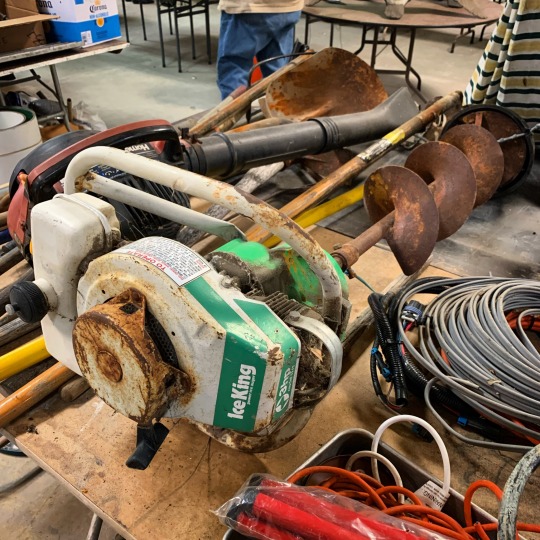
Dredged from the bottom of Lake Metigoshe after a failed attempt at the legendary Kinnischtzke Maneuver.
1 note
·
View note
Text
Lake Metigoshe State Park, North Dakota
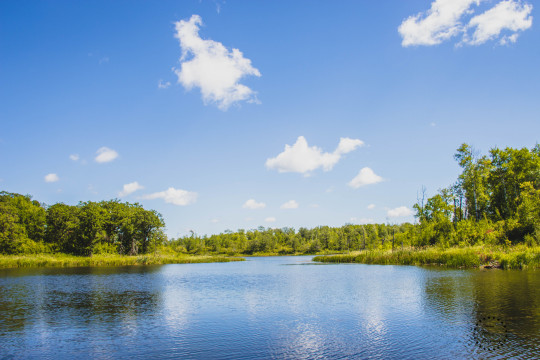
At the end of summer, we decided to go camping at Lake Metigoshe Sate Park. I had spent falls just near there at a camp as a teenager and loved it. And I wanted to go back. It’s such a hidden gem of ND!

Although we did have fun walking trails around the lake and setting up camp, and the bathrooms were quite nice, the experience was utterly ruined by a group of younger people not only blaring music all night, but they brought a karaoke machine and definitely used it. And the music they played...it was vile. I’m no prude. But I think that certain rap and pop songs probably shouldn’t be blasted to an entire campground especially via karaoke mic. if only because there are kids around. The problem was, that the park staff did nothing, and the people not only partied loudly all night but kept it going all the next day. They put their music on a boom box and carried it around the camp ground. So even when we tried to escape to the trails...we could still hear it across the lake.

Overall, the trip was ruined and we were very sad. We just wanted to enjoy our time in nature.

And you can tell by these pictures, we did try.

I took these photos while walking the trail, trying to escape the terrible music.

Hopefully you can see why people love to camp here - bad camping etiquette aside.

It was the end of August, but signs of fall were showing!


I had actually hoped to return for a hopefully better stay in the fall, but life became incredibly busy and then we had an early snow. Maybe it will work better next year!
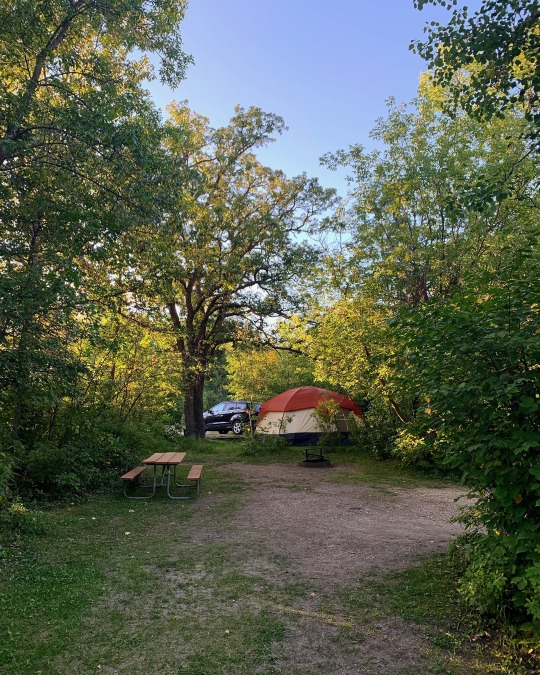
#Lake Metigoshe State Park#state park#north dakota#lake Metigoshe#fall#autumn#walk#hike#School Section Lake#camping
2 notes
·
View notes
Text
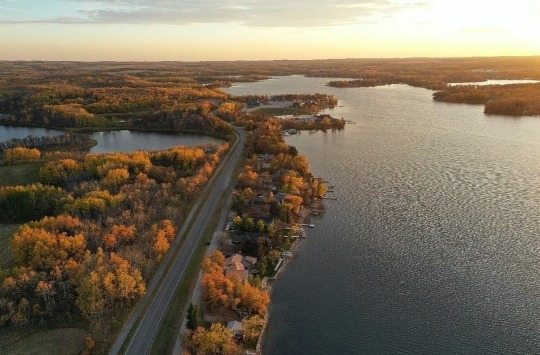
Lake Metigoshe by North Dakota Legendary
#north dakota#travel#nature#midwest#landscape#wanderlust#north dakota legendary#explore#sunset#aesthetic#adventure#fall#autumn
5 notes
·
View notes
Photo

Flipped through the husband’s phone today. Found this little gem from last weekend: baby in bed at nana and papa’s, evening mini dates cruising around the lake. (at Lake Metigoshe) https://www.instagram.com/p/CChnxnZnruA/?igshid=1e71lyf9s10y7
1 note
·
View note
Photo
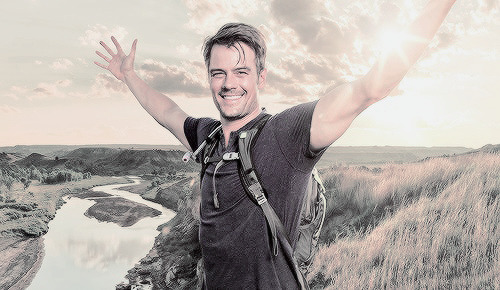









What are your favorite things to do here?:
“Favorite things Axl and I do together in North Dakota include carnival rides at the North Dakota State Fair, water parks and swimming at Lake Metigoshe.”
#Josh Duhamel#jduhameledit#dailymenedit#glamoroussource#Photoshoot#Campaigns#ND Legendary#Quotes#Edits#*#Long Post
16 notes
·
View notes
Text
Dispatches From Food Service Workers Across the U.S.: ‘I’m Trying Not to Panic’
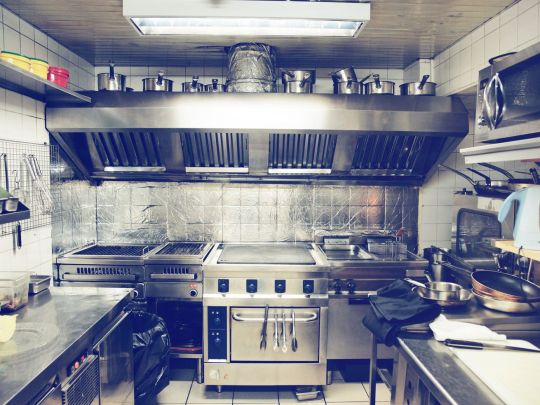
Shutterstock/Kondor83
Restaurant employees from Kentucky, North Dakota, New York, Oregon, and Minnesota share their stories
Last week, President Trump formed the Economic Revival Industry Group, a collection of 200 experts and industry leaders to inform the (possibly ill-advised) campaign to re-open the economy. The group, focused on restaurants, included numerous chain CEOs and celebrity chef-owners like Wolfgang Puck and Thomas Keller. And though the latter could hardly be expected to advocate for the needs of restaurant owners whose restaurants don’t have Michelin stars, there is another group notably absent from the committee: restaurant workers.
Independent restaurant owners are struggling with the realities and uncertainties of life in a pandemic, whether it’s having to lay off employees or trying to keep people paid as the business pivots to take-out only. But for your average food service worker — servers, bartenders, line cooks, and baristas — there is even less support. Restaurant employees made up 60 percent of the jobs lost in March. Twenty-two million people filed for unemployment in the past four weeks, leaving unemployment websites overwhelmed. The Paycheck Protection Program, which offers federal loans in exchange for keeping employees on payroll, is out of money. All this adds up to millions of food service workers being left without a paycheck.
Despite Trump’s plans, no one knows what the restaurant industry is going to look like on the other side of the pandemic. And so workers wait, hoping their restaurants will reopen, hoping they or their coworkers will be rehired, hoping there will be a workplace to come back to. As chains and fine-dining chefs are the only ones with access to the White House, it’s important to remember their experiences do not represent the restaurant industry as a whole. Whether or not restaurant workers, not merely restaurateurs, feel supported will be the true test of any government program’s success. With that in mind, we spoke to five restaurant workers across the country on what they’re experiencing right now. These are stories in their own words, edited lightly for clarity.
Gregg Adams, line cook at J Harrods, Louisville, Kentucky
The chef and I are the only kitchen staff left of four full-time and two part-timers. He takes a salary, I am on reduced hours, which means less money to repair the house and cars, much less save anything. Since this began we have been steadily losing customers. Our food isn’t geared for takeout, though we changed the menu some. Also, we made a lot of our money through drinks. Initially, the state only allowed the sale of closed alcohol containers, and some restaurants started selling flight bottles and half pints with soda or cup mixer on the side. Within a week, open alcohol sales were allowed rather than just packaged liquor, but it was too late for those who followed the rules.
I’m hanging in there, but I’m lucky. Not much has changed for me and my family. My wife is on medical disability with fixed income and doesn’t leave the house much. My teenager already practiced social distancing. My 26-year-old is working 60 hours a week at a local coffee chain. My 25-year-old works for UPS. I’m blessed to have employment. I know three other cooks and two chefs who are unemployed. But I can’t plan anything for anything now. I’m wondering about my concert tickets and my child’s education if my older children will get sick, and what my options are in general. I’m trying to not panic.
Massoud Violette-Sheikh, sous chef at the Heights, Ithaca, New York
I am 23 years old and have been working in the industry for five years, starting as a dishwasher at the Heights. My start in the industry was mainly out of necessity — dishwashing offered good hours and the possibility of upward mobility in the restaurant. But the work ethic and our local food community was contagious; I wouldn’t want to be in any other industry, even in these times. I rose to sous this past year. In an area where we are financially dependent on Ithaca College and Cornell as our main contributors to economic stimulation, this has train-wrecked the local economy.
At the Heights, all staff with the exception of our chef de cuisine have been temporarily let go. I think the post-pandemic dining landscape is going to be entirely different — staff cuts, wage cuts, and mandatory seating reduction will absolutely affect how we are able to eat. Even the most luxurious restaurants will have to cut back on menus, garnishes, and available reservations. I’m hopeful that diners will come out in droves after restaurants open up, but realistically that’s not likely. The social habits that we develop will linger. I spend a lot of time talking with my close friends and coworkers. Everyone just wants to be back in the kitchen — to be back home. As an individual I’m grateful for private grants such as the Restaurant Employee Relief Fund — programs like that are going to be our saviors. But our primary concern is how long our local independent restaurants, farms, and purveyors will be able to stay open. The debt to equity ratio in our industry is very high, and I expect to see places sink into irreversible debt. I hope customers will be patient as we get back on our feet; without their support, all that will be left is Chili’s and McDonald’s.
Marlena Chaboudy, cook at A Frame Bar & Grill, Westhope, North Dakota
Busy season is the beginning of spring through the end of summer. We are situated on Lake Metigoshe, and when the snow melts people start moving in their boats and readying their docks to enjoy their summer. We were all gearing up for that when the spread of the virus hit hard and hours were cut. Our place was then shut down for dine-in service and we tried to stay positive. I found out the secret was really not to make eye contact, because if I saw one of us start to tear up, it opened the floodgates for me.
I’m behind in rent, my vehicle is in need of a few repairs. I had planned on moving closer to work — I live about 40 miles away — and found a place, but will have to come by money for the utility and house deposits and rent in order to do so. My fiancé and I live together, and he also works at the A-Frame as a dishwasher. He has filed for unemployment but has a limited work history and hasn’t paid in enough in the quarters to draw unemployment. And he won’t get the one-sum stimulus check either, and that’s going to hurt. Living in a rural community, you can’t count on anything for relief. You can’t count on the small town store to get a delivery truck, or go to the store the same day and be able to buy a roll of toilet paper or a dozen eggs. I can’t guarantee that my internet will be functional much less my phone service, and trying to even access the unemployment website can take all day. You go to the gas station for a treat and you never know if they are open because if they haven’t had enough business that day to justify keeping the lights on, or paying an employee to sit there, they close early.
I don’t think the aid the government is giving is enough. Not at all! It’s getting bad everywhere. The people in the foodservice industry are the “blue collar” workers that everyone forgets about. We are not paid as much as the blue collar norm and making ends meet isn’t looking possible for most.
Rae Bullinger, former front of house at Rise Bagels, Minneapolis
We closed our dining room around March 16th, but kept our online and takeout phone ordering systems the same. After closing the dining room, it was fairly slow that first week, but we kept advertising the online and pick-up ordering and by the weekend our system just couldn’t keep up. On my weekend shift, we were so overwhelmed with online orders overnight that we actually had to turn the first customers away, because we were still trying to catch up with the online orders. The next day is when the owners decided to temporarily close. Before coronavirus, we had a good sense of how many bagels we needed each day of the week to fill our normal amount of orders. Once we started advertising more about online and phone ordering mid-March, our demand shifted to a point we couldn’t have predicted.
Before I started my job at Rise Bagel, I was a graduate student in the psychology field. I had to take a leave of absence in October due to an inpatient stay for my mental health, and decided to put school on pause and pursue a new career in food sustainability. I thought getting my foot in the door at a local restaurant that focuses on local, organic ingredients and sustainable practices would provide me with some great insight. The job finally gave me a sense of purpose and control when I hadn’t had that in a long time. However, when we suddenly had to close, it was like my sense of purpose also disappeared. My job was the one thing that kept me feeling certain about my future. Uncertainty about my future at Rise has led to an increase in my anxiety around leaving school and my future career. I have many fears of having to start all over again, and it’s hard to stay motivated when I can’t gain restaurant experience from my home.
Here in Minnesota, individual unemployment benefits are only given if you had made $3,000 or more before unemployment. Because I was in graduate school and had only been at my job at Rise for a few months, I did not meet this requirement and will not be receiving any unemployment benefits. For those making minimum wage (aka many of those in the food service industry), prerequisites like this may have some major impacts. I’m incredibly thankful to be living at home during this time with great support, but I couldn’t imagine being in a more dire situation and then denied benefits based on something I may not have had control over. I’m really glad something is being done for small business owners, but what really matters is what happens after this. A restaurant will only survive if better legislation is passed and people continue to visit even after social distancing orders are lifted. The attention and support food service employees and places are getting right now is amazing, but systematic change needs to occur for them to continue to survive.
Ashton Long, bartender, Portland, Oregon
We were all in an especially odd situation because we had just all been through training and had opened the restaurant, Bar King, to the public Monday, March 9th. Our restaurant closed down to the public on March 15th and began only providing takeout orders. Luckily, right now it is looking like we’ll be opening back up and all have our jobs back, but when? I don’t think anyone has even a clue. And that is terrifying.
My partner and I moved here in early January of this year. Luckily, he works from home, but I set out to find a job as soon as I got here, and even with my experience and my resume, it took me nearly two months to find something because of how competitive the service industry staffing is in Portland. I exhausted nearly all of my savings and threw all of my faith into the fact that I’d find a job when I got here, and then I worked for literally two weeks and then lost my job. I don’t remember a time in my life where I didn’t have two jobs and work anywhere from 40 to 70 hours a week, so having this much free time, and on such an incredibly STRICT budget of one income, has been extremely challenging to fill.
While I think the stimulus money is great, and quite literally a life saver for many — including me — unemployment has been a literal shit show and a nightmare to deal with. I still have yet to see any benefits or correspondence from either Michigan or Oregon to figure out what I need to do in this situation where I lived and worked in Michigan last year and Oregon now. While I do understand that having 2.2 MILLION people sign up for unemployment in the last month is overwhelming, if it weren’t for the stimulus check and my partner, I could very well be on my way back to Michigan right now to live with family. And as a 25-year-old who has never had to consider an option like that because I’ve always had work and savings, that is a horrifying and scary scenario.
If you’re a food service worker, Eater wants to hear your story. Please fill out this survey.
from Eater - All https://ift.tt/3cz9Lic
https://ift.tt/2KmWSfe

Shutterstock/Kondor83
Restaurant employees from Kentucky, North Dakota, New York, Oregon, and Minnesota share their stories
Last week, President Trump formed the Economic Revival Industry Group, a collection of 200 experts and industry leaders to inform the (possibly ill-advised) campaign to re-open the economy. The group, focused on restaurants, included numerous chain CEOs and celebrity chef-owners like Wolfgang Puck and Thomas Keller. And though the latter could hardly be expected to advocate for the needs of restaurant owners whose restaurants don’t have Michelin stars, there is another group notably absent from the committee: restaurant workers.
Independent restaurant owners are struggling with the realities and uncertainties of life in a pandemic, whether it’s having to lay off employees or trying to keep people paid as the business pivots to take-out only. But for your average food service worker — servers, bartenders, line cooks, and baristas — there is even less support. Restaurant employees made up 60 percent of the jobs lost in March. Twenty-two million people filed for unemployment in the past four weeks, leaving unemployment websites overwhelmed. The Paycheck Protection Program, which offers federal loans in exchange for keeping employees on payroll, is out of money. All this adds up to millions of food service workers being left without a paycheck.
Despite Trump’s plans, no one knows what the restaurant industry is going to look like on the other side of the pandemic. And so workers wait, hoping their restaurants will reopen, hoping they or their coworkers will be rehired, hoping there will be a workplace to come back to. As chains and fine-dining chefs are the only ones with access to the White House, it’s important to remember their experiences do not represent the restaurant industry as a whole. Whether or not restaurant workers, not merely restaurateurs, feel supported will be the true test of any government program’s success. With that in mind, we spoke to five restaurant workers across the country on what they’re experiencing right now. These are stories in their own words, edited lightly for clarity.
Gregg Adams, line cook at J Harrods, Louisville, Kentucky
The chef and I are the only kitchen staff left of four full-time and two part-timers. He takes a salary, I am on reduced hours, which means less money to repair the house and cars, much less save anything. Since this began we have been steadily losing customers. Our food isn’t geared for takeout, though we changed the menu some. Also, we made a lot of our money through drinks. Initially, the state only allowed the sale of closed alcohol containers, and some restaurants started selling flight bottles and half pints with soda or cup mixer on the side. Within a week, open alcohol sales were allowed rather than just packaged liquor, but it was too late for those who followed the rules.
I’m hanging in there, but I’m lucky. Not much has changed for me and my family. My wife is on medical disability with fixed income and doesn’t leave the house much. My teenager already practiced social distancing. My 26-year-old is working 60 hours a week at a local coffee chain. My 25-year-old works for UPS. I’m blessed to have employment. I know three other cooks and two chefs who are unemployed. But I can’t plan anything for anything now. I’m wondering about my concert tickets and my child’s education if my older children will get sick, and what my options are in general. I’m trying to not panic.
Massoud Violette-Sheikh, sous chef at the Heights, Ithaca, New York
I am 23 years old and have been working in the industry for five years, starting as a dishwasher at the Heights. My start in the industry was mainly out of necessity — dishwashing offered good hours and the possibility of upward mobility in the restaurant. But the work ethic and our local food community was contagious; I wouldn’t want to be in any other industry, even in these times. I rose to sous this past year. In an area where we are financially dependent on Ithaca College and Cornell as our main contributors to economic stimulation, this has train-wrecked the local economy.
At the Heights, all staff with the exception of our chef de cuisine have been temporarily let go. I think the post-pandemic dining landscape is going to be entirely different — staff cuts, wage cuts, and mandatory seating reduction will absolutely affect how we are able to eat. Even the most luxurious restaurants will have to cut back on menus, garnishes, and available reservations. I’m hopeful that diners will come out in droves after restaurants open up, but realistically that’s not likely. The social habits that we develop will linger. I spend a lot of time talking with my close friends and coworkers. Everyone just wants to be back in the kitchen — to be back home. As an individual I’m grateful for private grants such as the Restaurant Employee Relief Fund — programs like that are going to be our saviors. But our primary concern is how long our local independent restaurants, farms, and purveyors will be able to stay open. The debt to equity ratio in our industry is very high, and I expect to see places sink into irreversible debt. I hope customers will be patient as we get back on our feet; without their support, all that will be left is Chili’s and McDonald’s.
Marlena Chaboudy, cook at A Frame Bar & Grill, Westhope, North Dakota
Busy season is the beginning of spring through the end of summer. We are situated on Lake Metigoshe, and when the snow melts people start moving in their boats and readying their docks to enjoy their summer. We were all gearing up for that when the spread of the virus hit hard and hours were cut. Our place was then shut down for dine-in service and we tried to stay positive. I found out the secret was really not to make eye contact, because if I saw one of us start to tear up, it opened the floodgates for me.
I’m behind in rent, my vehicle is in need of a few repairs. I had planned on moving closer to work — I live about 40 miles away — and found a place, but will have to come by money for the utility and house deposits and rent in order to do so. My fiancé and I live together, and he also works at the A-Frame as a dishwasher. He has filed for unemployment but has a limited work history and hasn’t paid in enough in the quarters to draw unemployment. And he won’t get the one-sum stimulus check either, and that’s going to hurt. Living in a rural community, you can’t count on anything for relief. You can’t count on the small town store to get a delivery truck, or go to the store the same day and be able to buy a roll of toilet paper or a dozen eggs. I can’t guarantee that my internet will be functional much less my phone service, and trying to even access the unemployment website can take all day. You go to the gas station for a treat and you never know if they are open because if they haven’t had enough business that day to justify keeping the lights on, or paying an employee to sit there, they close early.
I don’t think the aid the government is giving is enough. Not at all! It’s getting bad everywhere. The people in the foodservice industry are the “blue collar” workers that everyone forgets about. We are not paid as much as the blue collar norm and making ends meet isn’t looking possible for most.
Rae Bullinger, former front of house at Rise Bagels, Minneapolis
We closed our dining room around March 16th, but kept our online and takeout phone ordering systems the same. After closing the dining room, it was fairly slow that first week, but we kept advertising the online and pick-up ordering and by the weekend our system just couldn’t keep up. On my weekend shift, we were so overwhelmed with online orders overnight that we actually had to turn the first customers away, because we were still trying to catch up with the online orders. The next day is when the owners decided to temporarily close. Before coronavirus, we had a good sense of how many bagels we needed each day of the week to fill our normal amount of orders. Once we started advertising more about online and phone ordering mid-March, our demand shifted to a point we couldn’t have predicted.
Before I started my job at Rise Bagel, I was a graduate student in the psychology field. I had to take a leave of absence in October due to an inpatient stay for my mental health, and decided to put school on pause and pursue a new career in food sustainability. I thought getting my foot in the door at a local restaurant that focuses on local, organic ingredients and sustainable practices would provide me with some great insight. The job finally gave me a sense of purpose and control when I hadn’t had that in a long time. However, when we suddenly had to close, it was like my sense of purpose also disappeared. My job was the one thing that kept me feeling certain about my future. Uncertainty about my future at Rise has led to an increase in my anxiety around leaving school and my future career. I have many fears of having to start all over again, and it’s hard to stay motivated when I can’t gain restaurant experience from my home.
Here in Minnesota, individual unemployment benefits are only given if you had made $3,000 or more before unemployment. Because I was in graduate school and had only been at my job at Rise for a few months, I did not meet this requirement and will not be receiving any unemployment benefits. For those making minimum wage (aka many of those in the food service industry), prerequisites like this may have some major impacts. I’m incredibly thankful to be living at home during this time with great support, but I couldn’t imagine being in a more dire situation and then denied benefits based on something I may not have had control over. I’m really glad something is being done for small business owners, but what really matters is what happens after this. A restaurant will only survive if better legislation is passed and people continue to visit even after social distancing orders are lifted. The attention and support food service employees and places are getting right now is amazing, but systematic change needs to occur for them to continue to survive.
Ashton Long, bartender, Portland, Oregon
We were all in an especially odd situation because we had just all been through training and had opened the restaurant, Bar King, to the public Monday, March 9th. Our restaurant closed down to the public on March 15th and began only providing takeout orders. Luckily, right now it is looking like we’ll be opening back up and all have our jobs back, but when? I don’t think anyone has even a clue. And that is terrifying.
My partner and I moved here in early January of this year. Luckily, he works from home, but I set out to find a job as soon as I got here, and even with my experience and my resume, it took me nearly two months to find something because of how competitive the service industry staffing is in Portland. I exhausted nearly all of my savings and threw all of my faith into the fact that I’d find a job when I got here, and then I worked for literally two weeks and then lost my job. I don’t remember a time in my life where I didn’t have two jobs and work anywhere from 40 to 70 hours a week, so having this much free time, and on such an incredibly STRICT budget of one income, has been extremely challenging to fill.
While I think the stimulus money is great, and quite literally a life saver for many — including me — unemployment has been a literal shit show and a nightmare to deal with. I still have yet to see any benefits or correspondence from either Michigan or Oregon to figure out what I need to do in this situation where I lived and worked in Michigan last year and Oregon now. While I do understand that having 2.2 MILLION people sign up for unemployment in the last month is overwhelming, if it weren’t for the stimulus check and my partner, I could very well be on my way back to Michigan right now to live with family. And as a 25-year-old who has never had to consider an option like that because I’ve always had work and savings, that is a horrifying and scary scenario.
If you’re a food service worker, Eater wants to hear your story. Please fill out this survey.
from Eater - All https://ift.tt/3cz9Lic
via Blogger https://ift.tt/2xPCMrm
0 notes
Photo

My editing skills have come a long way and will continue to. Repost of one of my first good shots when I got into photography. • • • • • • • #lake #sunset #sky #colorful #beautiful #water #clouds #boat #summer #sun #rainbow #night #canon #rebelt5 #dslr #camera #photography #photographer #nolanpewephotography (at Metigoshe Lake (sjö))
#canon#rainbow#boat#water#clouds#colorful#beautiful#summer#night#camera#sunset#photographer#dslr#nolanpewephotography#sun#sky#photography#rebelt5#lake
1 note
·
View note
Photo

Map oddities: On Lake Metigoshe, ND, your boat launch is in the US and your house is in Canada.
225 notes
·
View notes
Photo

Map oddities: On Lake Metigoshe, ND, your boat launch is in the US and your house is in Canada. [930x478]
15 notes
·
View notes
Text
Vacation: Lake Metigoshe, ND: Endless Adventures
The lake is always a fun time. You can do many different and fun things at the lake. Let’s venture out to Lake Metigoshe, ND, and see what family-friendly things we can find to do. Lake Metigoshe is on the US/Canada border and is one of the most popular places to vacation. It is in the Turtle Mountains and is just a fabulous place to visit and have some family fun.
Outdoor Biking/Hiking…
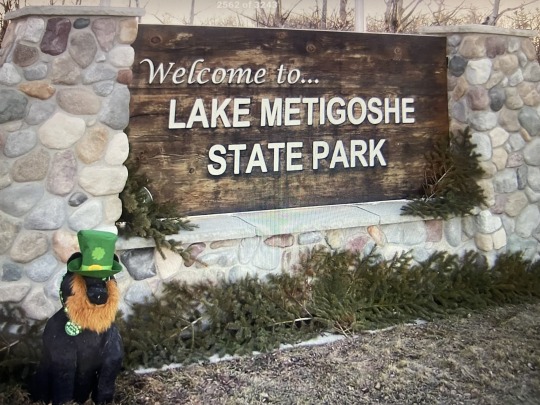
View On WordPress
0 notes
Photo

What’s Your Favorite Thing To Do Here?:
“Beside pushing hay bales, It’s seeing family and friends, spending time at Lake Metigoshe, driving to Fargo to see my Dad, and stopping in small towns I have never been to and grabbing a beer with locals.”
#jduhameledit#flawlessgentlemen#dailycelebrities#celebritiesource#Josh Duhamel#love of my life#DAT SMILE THO...#😍😭🌟💕#he's just so perfect okayyyy#also#surprise i'm crying hollaaaaa :))#***#Mine!
19 notes
·
View notes
Text
Northern Lights Camp, Turtle Mountains, ND

For me, personally, I find it very difficult to go back and revisit certain places from my past. As with most things when it comes to myself, it’s black and white. Either I love and adore the place (Garrison, ND) or I can’t even face it (almost any place from high school). But on this beautiful day in late September, I got to go back to a place that, even in its dysfunction, was so beautiful to me. It was a place I loved with all my heart. And when I got to return as an adult, I found I loved it even still. Even with the bad memories bombarding me, I walked forward into the golden sunshine and fell back in love with Northern Lights Camp in the Fall.
Let’s go...

Northern Lights camp sits on the shore of Lake Metigoshe in the Turtle Mountains of North Dakota. North Dakota has mountains? Well...no. I mean, for North Dakota they’re mountains! But really they’re just a lot of high hills absolutely smothered in trees and dotted with lakes. And the best time to visit (in my opinion) is always in fall. This is one of those hidden treasures of ND. It’s not notorious like Fargo, or tackled by tourists all summer like Medora. It’s ND’s own, special place where the locals mostly like to go.
Dad and I like to do one day trip (always to explore somewhere abandoned) before it gets snowy. In 2016 it was the Fort Ransom area. Last year it was Arena, ND. This year, we went to the abandoned SRA (where he went to high school) and then headed up to Northern Lights Camp. My dad now works for the church that owns it. And my history with this place? Well, I used to attend this camp in the fall when I was at church boarding school. And it was the highlight of my year. I adored “camp week”, as we called it. Camp week happened just after the first week or two of school started. It marked the beginning of fall and the beginning of getting to truly know everyone at school. I hadn’t been back to Northern Lights (or the Turtle Mountains) for 13 years. It was time.
(below: the boys’ cabins and bathroom)

I can say that, even through the restrictions and rules, Northern Lights always marked a bright place during a very dark time in my life. But coming back as adult was wonderful! No restrictions! I can walk all the trails, I don't have to stay in one spot, I don’t have to stay away from the “pizza hut” (we’ll get to that), and although we didn’t have time to take canoes to Masonic Island, no one was preventing me from doing so. Now, Northern Lights isn’t just a beautiful and quiet place, but a freeing one as well. Let’s walk around!
(Below: boys’ cabins and part of the brand new cafeteria building - they didn’t have that when I went here!)

View from the front of the camp looking at the building that houses the chapel up top and rooms/bathroom/laundry on the bottom. We usually were limited to staying in this open green area when I was here as a teenager, always had to be within sight of staff. Lots of activities and meetings and of course - the beginning of capture the flag happened here!
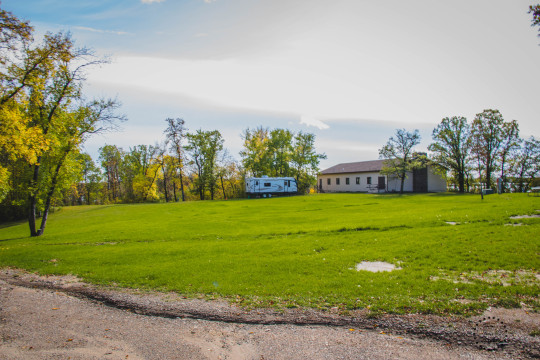
My favorite sight in camp ever since my first visit - the girls’ chalet and trail down to the lake, through the woods. Only the senior girls got to stay in the chalet! It was a huge treat.

Below: girls’ bathrooms and the little trail up to the girls’ cabins.

Here are the revamped girls’ cabins for grades 9-11. Why weren’t they this nice when I was there!? Our cabins were so ghetto! But we never minded. I can’t say I loved the cobwebs and spiders but I was so excited about camp I didn’t care much.

Looking down the path from the girls’ cabin to the common area of camp.

There was a new swing on this tree I hadn’t seen before! It was fun. Husband and I tried it out. I can only imagine the antics we would have tried on this thing as teenagers - it probably would have been banned for us immediately due to sheer stupidity on our part! But hey, as a teenager you’re invincible!
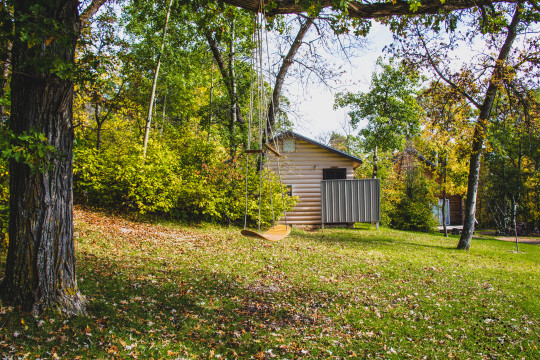
Back to my favorite view. Honestly, one reason I ended up returning to boarding school my senior year was for all the senior perks. One perk? Getting to stay in the very nice chalet with the other senior girls! Such a treat compared to the moldy, spidery cabins. It doesn’t look like much, but this was luxury to us! It had a bathroom inside and nice warm rooms. No drafts here! It was every bit the treat I was hoping for when I finally got to stay here as a senior with the rest of the girls from my class.

I had to head down this trail, of course. Usually we were forbidden to, back when I was here for camp week.

Into the woods we go!
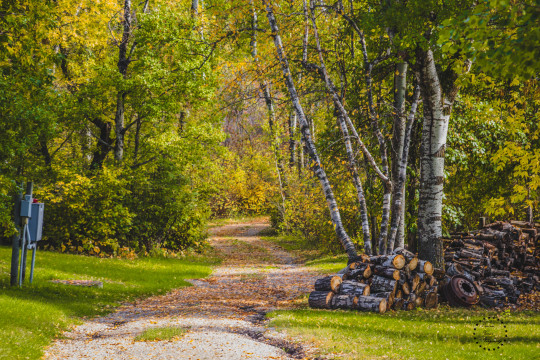
And the trail goes into a clearing where you can see the meeting building from another angle.
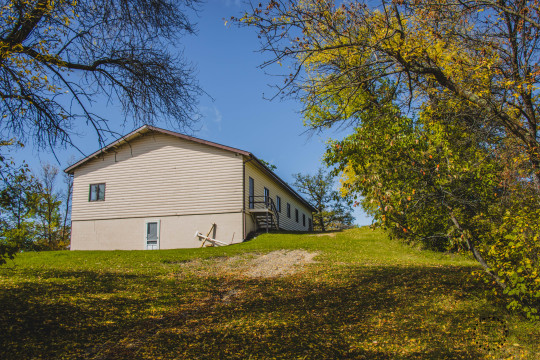
And back down the trail to go past the boathouse and to the lake!
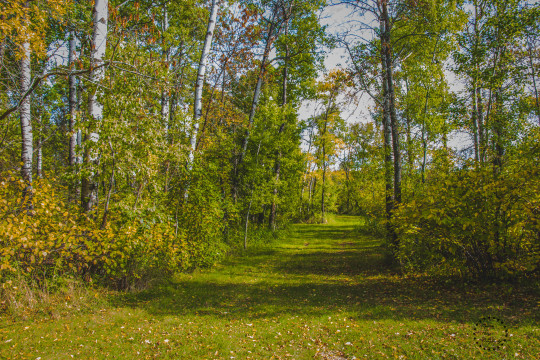
Here we are! Lake Metigoshe!

There’s Masonic Island - so near yet so forbidden to us. A few brave students canoed there and didn’t get caught. They spoke of weird stone alters and structures, but always got spooked and left immediately. Here’s what I could find on Masonic Island online. Anyway, just like most everything else we were forbidden from doing, Masonic Island is harmless and we were probably kept from going there for the main reason we were forbidden from doing anything - they were afraid we would meet up with boys. Can you hear my eyes rolling? Anyway.
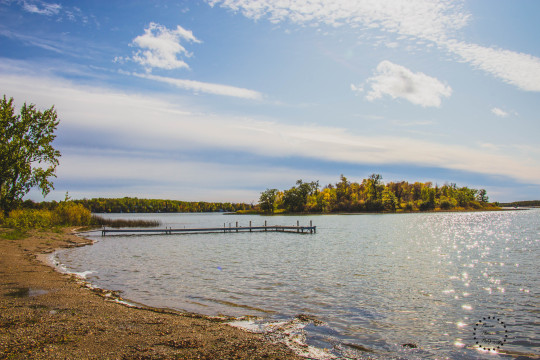
The light wasn’t great on this day, it was very harsh and my camera is still on the fritz, but I did my best to capture the place.
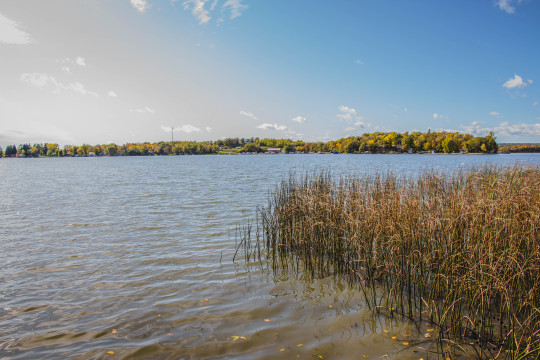
Below you can see the boat house and a corner of the meeting building.

Immediately I turned to the trails. I was never allowed to hike the trails and knew it was what I wanted to do when I visited as an adult. So that’s what I did. I was alone. And I set off, marching down the trails looking for my formerly forbidden destination.
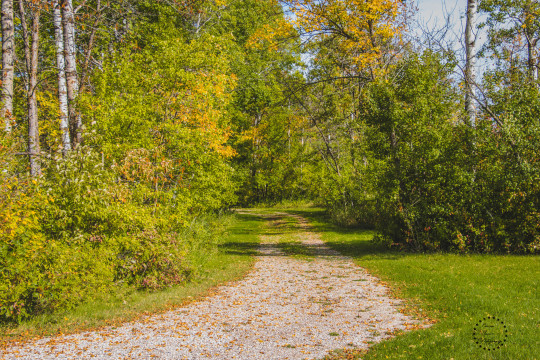
It was ridiculously exciting to walk the trails. And I felt deeply sad that I hadn’t been allowed to during camp week. Because the trails are gorgeous and quiet and healing.
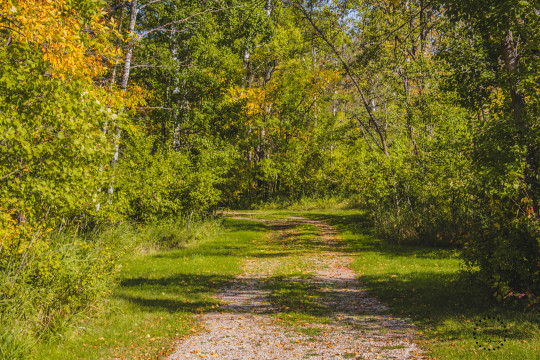
Especially in fall, as you can see, these trails are perfect to walk down. Although, as I said, I was doing more of a determined march down them.
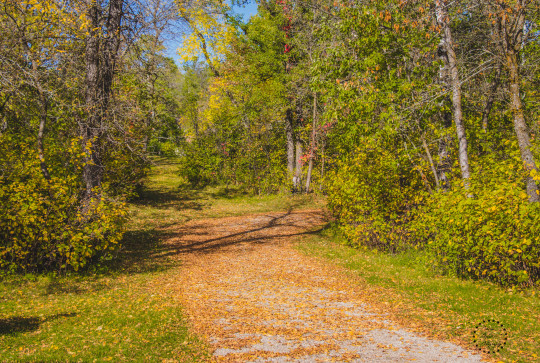

There were such pretty views of the lake!
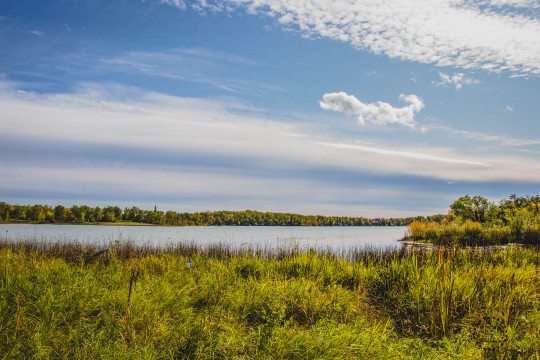
Then I turned to go into the deep woods. I’m surprised I wasn’t worried about getting lost. As I said, I hadn’t been allowed on these trails during camp week (looking back, why would you forbid the students from literally walking in nature when they’re at camp? Well because they could meet up with boys of course!)

But somehow, my internal compass steered me correctly.

I blazed the trails. I felt like I was being drawn to my destination and very much enjoyed the journey!
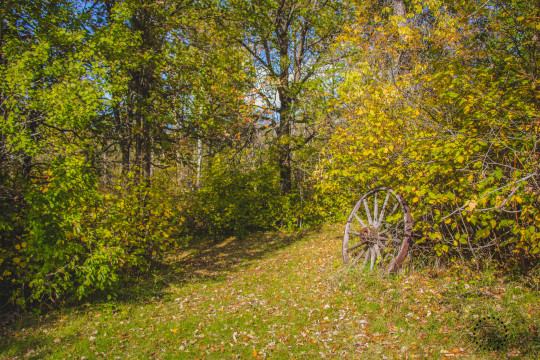
Just through these trees (below) you could see the sparkling lake.
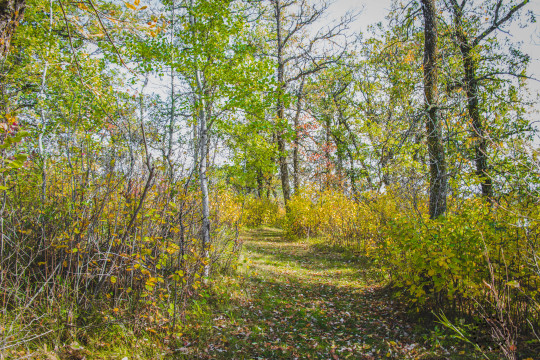
I tried not to march away from my memories as I went down the trails. I let them come. It was fairly healing, actually.

There was so many sun-dappled paths to explore!
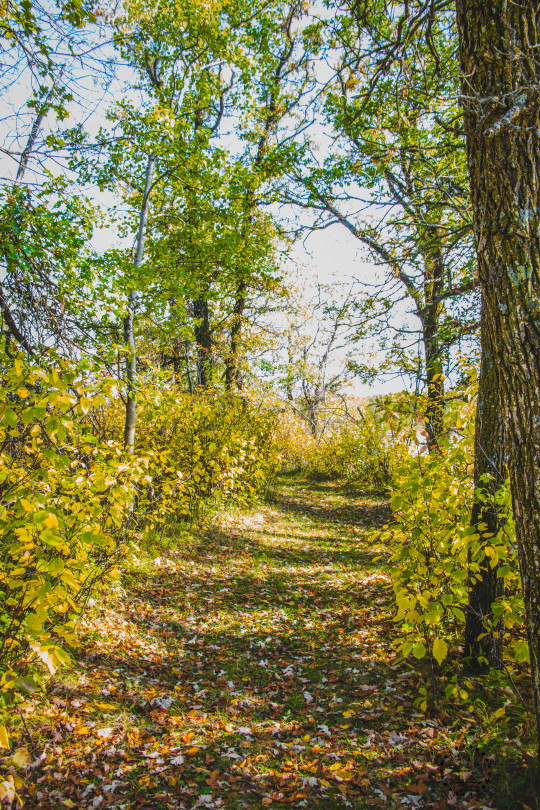
Being from North Dakota, I am fascinated by groups of trees because they are so rare.

All I could hear was my own breath and the crunch of leaves and grass under my feet.

I came to this oak tree and somehow knew I was on the right track, even though I’d never been on the trails before.

I could feel it. I was getting closer.
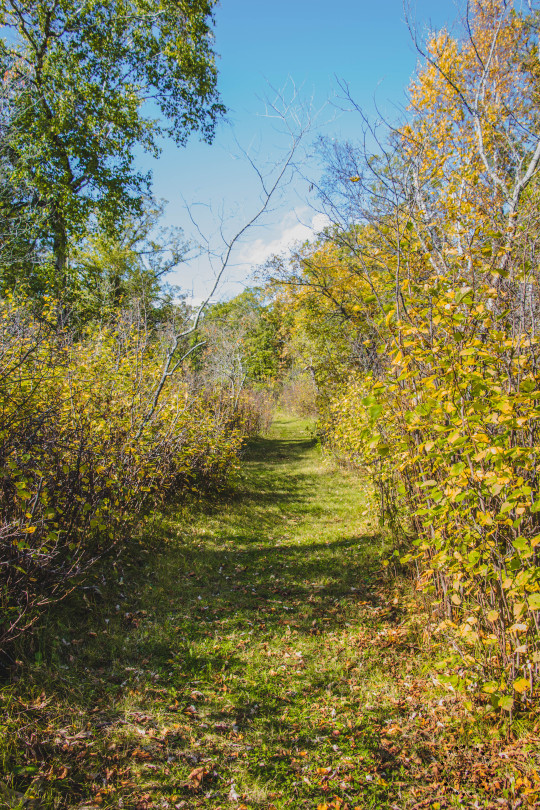
I reached a clearing and let my instincts guide the way.

Here we are. The Pizza Hut.

A mysterious place I was always forbidden to go during camp week (add that to the long list). Only certain older kids went here. When I was a freshman/sophomore it was the older girls who wouldn’t let me go here (for whatever reason) and when I finally got back as a senior it was older boys and staff (usually male staff). But I was fascinated! Just try to keep me away from something abandoned! I went once as a senior during capture the flag but it was too dark to see much.
So it was the first place I went 13 years later when I got to camp, of course. I marched right down the trails to the Pizza Hut. This is what I had in my mind when I knew we were going to visit. I was finally going to see the Pizza Hut. That place always only reserved for the “right” students or staff, which I never seemed to be one of. Now, I was finally here. You may think, what’s the big deal? Well, for one thing it’s a mysterious abandoned tower-like structure in the woods. And I’ve always been obsessed with abandoned places. For another, I’d heard of it ever since I was a freshman and had always been kept from it. When you are restricted in every way, shape, and form, often for no reason or just ridiculous reasons, you want to break those restrictions. Even if you’ve had to wait years into the future to do it. I wish I could put it into better words but sometimes you just have to walk in a boarding school student’s shoes to understand.

Before I left, I asked one of dad’s friends (and a longtime camp caretaker) what the Pizza Hut was all about. Here’s the scoop!
It was a weather research station way back in the day.
Then they stored the old pizza ovens from SRA here, and there they remain to this day.
There are giant water tanks in the basement, too. They were supposed to supply water to the camp but that never happened.
Basically, a lot of ideas went into this place that never got completed. And now it’s boarded up and it’s a climbing wall for campers.
Now I know! And now you do, too.

Back down the trails I went, this time to find my people. I had accomplished one goal - I saw the Pizza Hut. Later I took dad back there. He was interested too. But we couldn’t find a way inside - bummer.
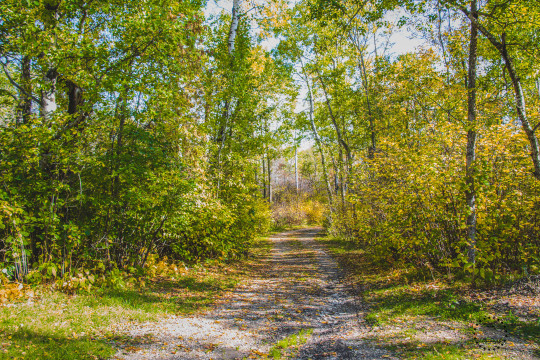
I found my husband exploring on his own and told him a few camp stories. He asked about the trails on the boys’ side of camp. And I told him it was the boys’ side - I was absolutely forbidden to go near that side of camp. He snorted and said, “What is camp for if you can’t do half the stuff!?” I told him it didn’t matter at the time. Not much, anyway. Camp week was freedom compared to the rest of the school year. He just shook his head. But it’s true. It was, as sad as that is.

We met up with dad who was excited to show us some trails he worked on earlier in the year when he was at camp helping out. And they just so happened to be on the boys’ side of camp! Scandalous.

What was interesting to me was dad’s experience as an academy camper here vs. mine. He could go anywhere and do anything including kissing a girl in the bushes and not get in trouble! I can not tell you the hell I would have caught had I been found in the same situation.
He kept saying things like, “I bet when you were here you guys would run off into the woods too!” or he’d ask me if I’d been on this trail or that. No. We weren’t allowed. I said it over and over again. He seemed mystified by that. His experience was so opposite. Was it because he is a male and I am female? Probably. Because it was the 70s vs. the early 2000s? Maybe. A totally different staff? Possibly. I may never know.

Below: a page from my dad’s 1975 school yearbook - they loved camp week back then just as much as we did!

I asked dad about these old wagon wheels and parts around camp and he said somewhere along the way someone dumped them around camp to lend a “rustic” touch.

It was exciting to go on more trails I had never seen, and again I felt sad that we were forbidden from going on these trails. Because they’re so pretty! Whereas the trails on the girls’ side meander over the hillside overlooking the lake, the boys are in the deep, deep woods and have swampland dotted throughout.

And because of that, there were so many mushrooms we found!

I was delighted. I had never seen the classic red capped mushrooms with white bases before in ND!

Usually I just see mushrooms like these big, soggy guys on this tree (below) or the typical white mushrooms.

Dad helped me get shots of these by pulling the grass and leaves away from the mushrooms. We were charmed.

We reached a swampy clearing and found what dad wanted to show us.

A big rope swing in the middle of the woods! How fun is that!?

Dad hopped right on and told my husband to push him. LOL!

So he did! Then husband took a turn trying to climb the rope swing. I was too busy photographing mushrooms to try it. That’s pretty typical of me!
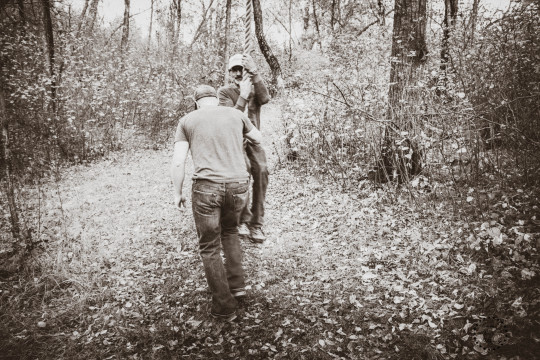
I got the shot! Isn’t it beautiful? Nature is amazing.

We ended our time standing by a place on the boys’ trails overlooking a bit of the lake.
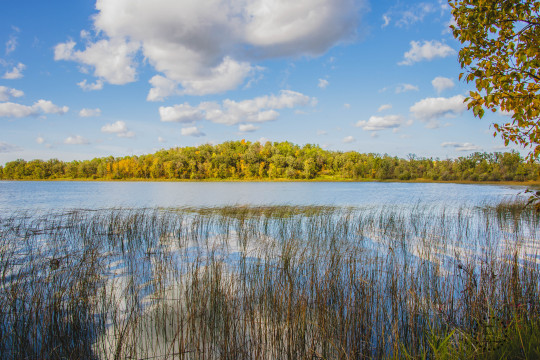
Dad shared his camp week memories. Told us the story of him kissing a girl in the bushes. I was scandalized. Husband thinks we are all weird.
I shared stories of the highlight of camp week - capture of the flag.
It was always boys against girls (of course) and always late at night. We started at the flagpole on the green by the cafeteria. If you were an underclassman (especially freshman) you were usually made to guard the line. It was always the older and athletic kids who got to go deep into the woods on trails and hide and guard the flag. And staff did play with us - mostly the male staff. The female staff tended to sit on the steps of the cafeteria, the light from the windows spilling over them, sitting and sipping hot drinks and watching us play. When I was a freshman/sophomore I was a) an underclassmen and b) nowhere near athletic (I cried through PE class). I was relegated to being ignored or told to guard the line. When I came back as a senior I had more say but was still terribly not athletic and by that point didn’t care as much. I had more of a run of the girls’ trails. Do I remember who won? I think the boys usually did. The male staff usually went on the girls’ team because the boys’ took it so dead seriously. As in, they were ready to fight you to the death over their flag. Ridiculous - but then again, I’m not a terribly competitive person.
The part of capture the flag I always liked was painting my face. Just with whatever makeup we had, I think. Not all girls did it, and usually it was just a few smudges on the cheeks. In fact, I’m not even sure when the trend started. But I took it to new heights. I may have been useless athletically but never artistically! So I would paint super elaborate designs all over my face with eyeliner (I think they usually looked like spider webs - I have photos somewhere) and usually a few other girls wanted me to help with their’s, too. I was happy to help. There’s a place for most people in some parts of capture the flag, I guess!
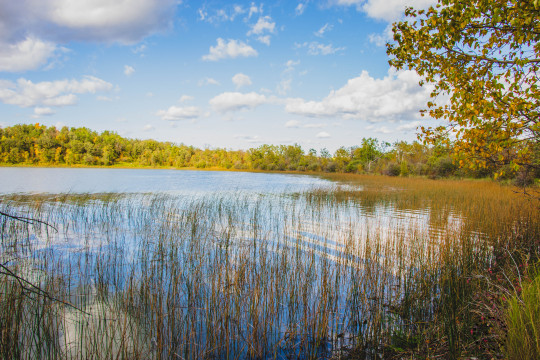
I look around this place and I see the sheer beauty I saw before, as a teenager, and I understand why I adored it so much despite everything. I loved the cold mornings. The camp food. Dipping toes in the freezing lake. Painting our faces for capture the flag. Sure, as an adult I see the glaring dysfunction. But then? I just saw the leaves starting to turn and the lake sparkling thought trees. And it was good.

youtube
0 notes
Photo

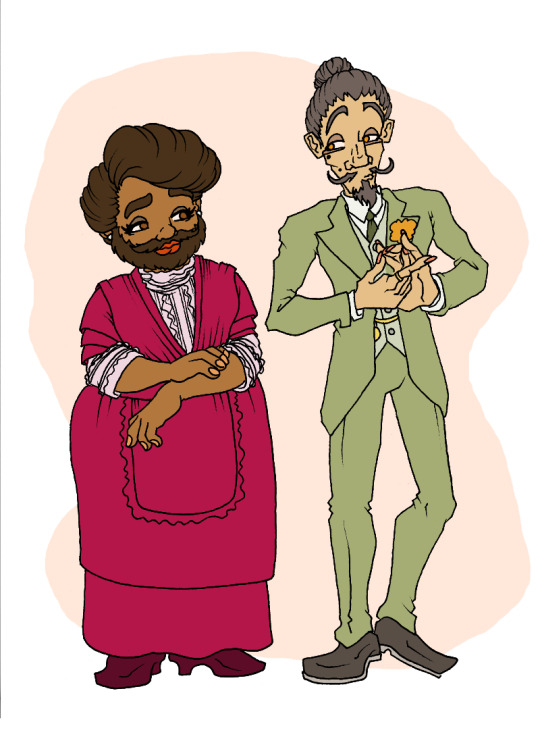

A whi-i-i-i-i-ile back, I got asked about MM's romantic relationships, and I thought, y'know, since it's Valentine's Day, maybe I'd actually draw those characters. It's not a very long list; as I was creating the character, and I had to figure out his sexuality, it seemed obvious that it was gonna have to be either all or nothing, and I thought that nothing would be the more interesting way to go because it's going against type for the sort of vaguely-sleazy character archetype that MM fits into. Fella is totally asexual, with no sex drive, and is really very grossed out by the entire concept. He is, however, not without the ability to form romantic attachments, because this makes him more tragic and opens up potential story possibilities. Those stories will be as follows (spoilers ahoy):
"Crocodile Rock". Waset (now known as Thebes), Egypt, 1465BC-or-so (Eighteenth Dynasty New Kingdom). MM is doing pretty well for himself, with steady employment as a sort of official crocodile whisperer, helpfully suggesting to the crocodiles that they not eat people, and providing crocodile dung to make contraceptives. (That was a thing.) He's not entirely sure how it ends up happening, but he finds himself also kind-of, sort-of, totally dating one of the pharaoh's bodyguards, an entirely-out-of-his-league young man with obviously questionable taste and a charmingly reckless personality, named Nakht-Het. MM is still kinda bitter about the entire situation.
"Sideshow". United States, 1908. Definitely one of the better times in MM's life, touring the US with a traveling circus. He had a magic act with sword-swallowing, fire-eating, snake charming, and various illusions, all styled in a kind of omni-mystical-oriental patois. Something ends up blossoming between himself and the widowed Mrs. Rita Renaldo, who fled the Thousand Days' War in Columbia only to find tremendous success as the circus' bearded lady who sings with a voice befitting a great opera star. It's lovely, until it all goes to hell.
"Smoke on the Water". Lake Metigoshe, United States, the not-too-distant future. The typical kind of MM caper, and one of the first Makeshift Man stories that I came up with, actually, where he gets hired by a forest god to find and retrieve her missing magical firebrand. Later, in a different issue (which, for now, has the working title of "Flower of the Mountain") they go on an actual date. With, like, dinner and dancing. I mean, what can you do? You see a millenia-old elemental spirit tear a deer carcass open with her teeth and your heart goes doki-doki... (Metigoshe will be a recurring character in some later issues as well, when the whole situation with Satan n' all starts to get...serious...)
Happy hearts day, y'all. Do something nice for yourself. <3
31 notes
·
View notes
Photo

Tiny skipper. . . . (And for those asking, she does have and wear a life jacket, pictured. This pontoon has childproof doors, so unlike the ski boat, we do allow her to be free of that extra heat when just slowly cruising the empty bays.) (at Lake Metigoshe) https://www.instagram.com/p/CCRS3MlntRr/?igshid=19ckppo01ddnq
0 notes
Quote
Shutterstock/Kondor83
Restaurant employees from Kentucky, North Dakota, New York, Oregon, and Minnesota share their stories
Last week, President Trump formed the Economic Revival Industry Group, a collection of 200 experts and industry leaders to inform the (possibly ill-advised) campaign to re-open the economy. The group, focused on restaurants, included numerous chain CEOs and celebrity chef-owners like Wolfgang Puck and Thomas Keller. And though the latter could hardly be expected to advocate for the needs of restaurant owners whose restaurants don’t have Michelin stars, there is another group notably absent from the committee: restaurant workers.
Independent restaurant owners are struggling with the realities and uncertainties of life in a pandemic, whether it’s having to lay off employees or trying to keep people paid as the business pivots to take-out only. But for your average food service worker — servers, bartenders, line cooks, and baristas — there is even less support. Restaurant employees made up 60 percent of the jobs lost in March. Twenty-two million people filed for unemployment in the past four weeks, leaving unemployment websites overwhelmed. The Paycheck Protection Program, which offers federal loans in exchange for keeping employees on payroll, is out of money. All this adds up to millions of food service workers being left without a paycheck.
Despite Trump’s plans, no one knows what the restaurant industry is going to look like on the other side of the pandemic. And so workers wait, hoping their restaurants will reopen, hoping they or their coworkers will be rehired, hoping there will be a workplace to come back to. As chains and fine-dining chefs are the only ones with access to the White House, it’s important to remember their experiences do not represent the restaurant industry as a whole. Whether or not restaurant workers, not merely restaurateurs, feel supported will be the true test of any government program’s success. With that in mind, we spoke to five restaurant workers across the country on what they’re experiencing right now. These are stories in their own words, edited lightly for clarity.
Gregg Adams, line cook at J Harrods, Louisville, Kentucky
The chef and I are the only kitchen staff left of four full-time and two part-timers. He takes a salary, I am on reduced hours, which means less money to repair the house and cars, much less save anything. Since this began we have been steadily losing customers. Our food isn’t geared for takeout, though we changed the menu some. Also, we made a lot of our money through drinks. Initially, the state only allowed the sale of closed alcohol containers, and some restaurants started selling flight bottles and half pints with soda or cup mixer on the side. Within a week, open alcohol sales were allowed rather than just packaged liquor, but it was too late for those who followed the rules.
I’m hanging in there, but I’m lucky. Not much has changed for me and my family. My wife is on medical disability with fixed income and doesn’t leave the house much. My teenager already practiced social distancing. My 26-year-old is working 60 hours a week at a local coffee chain. My 25-year-old works for UPS. I’m blessed to have employment. I know three other cooks and two chefs who are unemployed. But I can’t plan anything for anything now. I’m wondering about my concert tickets and my child’s education if my older children will get sick, and what my options are in general. I’m trying to not panic.
Massoud Violette-Sheikh, sous chef at the Heights, Ithaca, New York
I am 23 years old and have been working in the industry for five years, starting as a dishwasher at the Heights. My start in the industry was mainly out of necessity — dishwashing offered good hours and the possibility of upward mobility in the restaurant. But the work ethic and our local food community was contagious; I wouldn’t want to be in any other industry, even in these times. I rose to sous this past year. In an area where we are financially dependent on Ithaca College and Cornell as our main contributors to economic stimulation, this has train-wrecked the local economy.
At the Heights, all staff with the exception of our chef de cuisine have been temporarily let go. I think the post-pandemic dining landscape is going to be entirely different — staff cuts, wage cuts, and mandatory seating reduction will absolutely affect how we are able to eat. Even the most luxurious restaurants will have to cut back on menus, garnishes, and available reservations. I’m hopeful that diners will come out in droves after restaurants open up, but realistically that’s not likely. The social habits that we develop will linger. I spend a lot of time talking with my close friends and coworkers. Everyone just wants to be back in the kitchen — to be back home. As an individual I’m grateful for private grants such as the Restaurant Employee Relief Fund — programs like that are going to be our saviors. But our primary concern is how long our local independent restaurants, farms, and purveyors will be able to stay open. The debt to equity ratio in our industry is very high, and I expect to see places sink into irreversible debt. I hope customers will be patient as we get back on our feet; without their support, all that will be left is Chili’s and McDonald’s.
Marlena Chaboudy, cook at A Frame Bar & Grill, Westhope, North Dakota
Busy season is the beginning of spring through the end of summer. We are situated on Lake Metigoshe, and when the snow melts people start moving in their boats and readying their docks to enjoy their summer. We were all gearing up for that when the spread of the virus hit hard and hours were cut. Our place was then shut down for dine-in service and we tried to stay positive. I found out the secret was really not to make eye contact, because if I saw one of us start to tear up, it opened the floodgates for me.
I’m behind in rent, my vehicle is in need of a few repairs. I had planned on moving closer to work — I live about 40 miles away — and found a place, but will have to come by money for the utility and house deposits and rent in order to do so. My fiancé and I live together, and he also works at the A-Frame as a dishwasher. He has filed for unemployment but has a limited work history and hasn’t paid in enough in the quarters to draw unemployment. And he won’t get the one-sum stimulus check either, and that’s going to hurt. Living in a rural community, you can’t count on anything for relief. You can’t count on the small town store to get a delivery truck, or go to the store the same day and be able to buy a roll of toilet paper or a dozen eggs. I can’t guarantee that my internet will be functional much less my phone service, and trying to even access the unemployment website can take all day. You go to the gas station for a treat and you never know if they are open because if they haven’t had enough business that day to justify keeping the lights on, or paying an employee to sit there, they close early.
I don’t think the aid the government is giving is enough. Not at all! It’s getting bad everywhere. The people in the foodservice industry are the “blue collar” workers that everyone forgets about. We are not paid as much as the blue collar norm and making ends meet isn’t looking possible for most.
Rae Bullinger, former front of house at Rise Bagels, Minneapolis
We closed our dining room around March 16th, but kept our online and takeout phone ordering systems the same. After closing the dining room, it was fairly slow that first week, but we kept advertising the online and pick-up ordering and by the weekend our system just couldn’t keep up. On my weekend shift, we were so overwhelmed with online orders overnight that we actually had to turn the first customers away, because we were still trying to catch up with the online orders. The next day is when the owners decided to temporarily close. Before coronavirus, we had a good sense of how many bagels we needed each day of the week to fill our normal amount of orders. Once we started advertising more about online and phone ordering mid-March, our demand shifted to a point we couldn’t have predicted.
Before I started my job at Rise Bagel, I was a graduate student in the psychology field. I had to take a leave of absence in October due to an inpatient stay for my mental health, and decided to put school on pause and pursue a new career in food sustainability. I thought getting my foot in the door at a local restaurant that focuses on local, organic ingredients and sustainable practices would provide me with some great insight. The job finally gave me a sense of purpose and control when I hadn’t had that in a long time. However, when we suddenly had to close, it was like my sense of purpose also disappeared. My job was the one thing that kept me feeling certain about my future. Uncertainty about my future at Rise has led to an increase in my anxiety around leaving school and my future career. I have many fears of having to start all over again, and it’s hard to stay motivated when I can’t gain restaurant experience from my home.
Here in Minnesota, individual unemployment benefits are only given if you had made $3,000 or more before unemployment. Because I was in graduate school and had only been at my job at Rise for a few months, I did not meet this requirement and will not be receiving any unemployment benefits. For those making minimum wage (aka many of those in the food service industry), prerequisites like this may have some major impacts. I’m incredibly thankful to be living at home during this time with great support, but I couldn’t imagine being in a more dire situation and then denied benefits based on something I may not have had control over. I’m really glad something is being done for small business owners, but what really matters is what happens after this. A restaurant will only survive if better legislation is passed and people continue to visit even after social distancing orders are lifted. The attention and support food service employees and places are getting right now is amazing, but systematic change needs to occur for them to continue to survive.
Ashton Long, bartender, Portland, Oregon
We were all in an especially odd situation because we had just all been through training and had opened the restaurant, Bar King, to the public Monday, March 9th. Our restaurant closed down to the public on March 15th and began only providing takeout orders. Luckily, right now it is looking like we’ll be opening back up and all have our jobs back, but when? I don’t think anyone has even a clue. And that is terrifying.
My partner and I moved here in early January of this year. Luckily, he works from home, but I set out to find a job as soon as I got here, and even with my experience and my resume, it took me nearly two months to find something because of how competitive the service industry staffing is in Portland. I exhausted nearly all of my savings and threw all of my faith into the fact that I’d find a job when I got here, and then I worked for literally two weeks and then lost my job. I don’t remember a time in my life where I didn’t have two jobs and work anywhere from 40 to 70 hours a week, so having this much free time, and on such an incredibly STRICT budget of one income, has been extremely challenging to fill.
While I think the stimulus money is great, and quite literally a life saver for many — including me — unemployment has been a literal shit show and a nightmare to deal with. I still have yet to see any benefits or correspondence from either Michigan or Oregon to figure out what I need to do in this situation where I lived and worked in Michigan last year and Oregon now. While I do understand that having 2.2 MILLION people sign up for unemployment in the last month is overwhelming, if it weren’t for the stimulus check and my partner, I could very well be on my way back to Michigan right now to live with family. And as a 25-year-old who has never had to consider an option like that because I’ve always had work and savings, that is a horrifying and scary scenario.
If you’re a food service worker, Eater wants to hear your story. Please fill out this survey.
from Eater - All https://ift.tt/3cz9Lic
http://easyfoodnetwork.blogspot.com/2020/04/dispatches-from-food-service-workers.html
0 notes